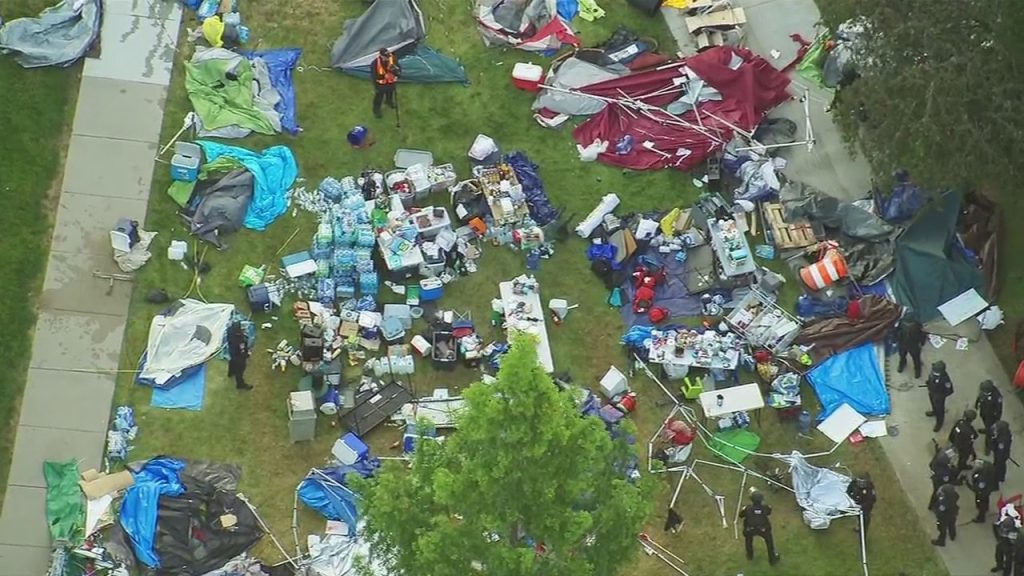An anti-Israel encampment at Wayne State University in Detroit was dismantled by police early Thursday, resulting in the arrests of at least eight protesters during clashes with authorities on campus. Wayne State University’s Associate Vice President of Communications, Matt Lockwood, confirmed that six protesters were arrested for trespassing, one for resisting and obstructing, and one for assaulting a police officer. Video footage captured protesters clashing with police in riot gear, while clean-up crews removed tents and bags filled with trash that had accumulated at the encampment.
Wayne State University President Kimberly Andrews Espy stated that the encampment presented legal, health, safety, and operational challenges for the community. She also mentioned that the encampment created an environment of exclusion, making some members of the campus community feel unwelcome and unable to fully participate in campus life. Despite multiple attempts by university leaders to ask protesters to remove the encampment, the protesters refused to do so, according to Lockwood. The encampment was set up by protesters to demand the university’s divestment from Israel, resulting in rising tensions that forced all classes to be held remotely until further notice due to the encampment being deemed an ongoing public safety issue.
The tensions surrounding the encampment at Wayne State University are reflective of similar incidents at other universities across the country in the wake of the ongoing conflict between Israel and Hamas. Last week, police cleared an anti-Israel encampment at the University of Michigan due to it posing a fire risk. The dismantling of these encampments has sparked clashes between protesters and authorities, leading to multiple arrests. These actions have raised concerns about the safety and well-being of members of the campus communities involved in the demonstrations.
The clashes at Wayne State University highlight the challenges faced by university administrators in managing protests and activism on their campuses. While protests are a fundamental aspect of free speech and expression, they can also create legal, health, safety, and logistical challenges for the institutions. University leaders must strike a balance between allowing peaceful demonstrations and ensuring the safety and well-being of all members of the campus community. The refusal of protesters to comply with requests to remove the encampment at Wayne State University ultimately led to police intervention and arrests, underscoring the complexities of managing such situations.
The removal of the anti-Israel encampment at Wayne State University has sparked discussions about divestment from the Jewish state and raised questions about the role of universities in political and social activism. The encampment was set up as a form of protest to demand the university’s divestment from Israel, reflecting broader debates about the Israeli-Palestinian conflict on college campuses. The clashes and arrests resulting from the dismantling of the encampment have drawn attention to the challenges universities face in navigating politically charged issues and balancing competing perspectives within their communities.
In light of the ongoing conflict between Israel and Hamas, universities across the country are grappling with how to address protests and demonstrations related to the Israeli-Palestinian conflict on their campuses. The dismantling of anti-Israel encampments at Wayne State University and other institutions underscores the complexities of managing activism and free speech while maintaining a safe and inclusive campus environment. These incidents serve as a reminder of the importance of open dialogue, respectful engagement, and peaceful expression of diverse viewpoints in fostering a vibrant and inclusive academic community.


